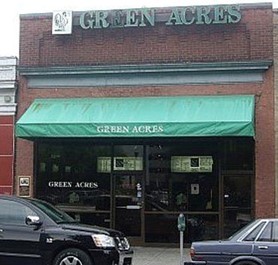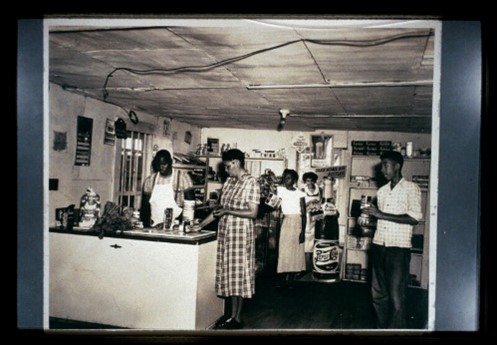Post Contributed by Mattison Bond, Project Outreach and Research Associate
Digging Through the Tapes: Celebrating Black Business Month in August.
While we celebrate Black History month in February, August also holds a number of African American commemorations and celebrations that are recognized. Marcus Garvey Day is celebrated on August 17th. Nat Turner’s Revolt and the beginning of the Haitian Revolution also happened within the month of August. Black August, a month-long commemoration that focuses on the lives and works of political prisoners and freedom fighters is meant to be a time of educating and reflecting on the fight for black liberation and those who have risked their lives for it.
August is also Black Business Month. Started in 2004, the month is meant to recognize and support Black entrepreneurs and their businesses. And while you may have taken the time to buy from your favorite black business and support your brother/sister/ cousin/ friend who considers their selves an entrepreneur, we at the John Hope Franklin Center encourage you to take it a step further by learning about some of the black businesses that are mentioned within the Behind the Veil digital collection!
There is an array of oral histories within the collection that mention or focus on Black businesses within the South during Jim Crow. To start there are two oral histories that fall under the occupation of being “self-employed”. One of them belonging to Roosevelt Cuffie [Roosevelt Cuffie interview recording, 1994 June 29 / Behind the Veil / Duke Digital Repository] of Sylvester, GA. The other from Charles Gratton [Charles Gratton interview recording, 1994 June 22 / Behind the Veil / Duke Digital Repository] of Birmingham, AL who became a business owner in 1957/58, operating the Green Acres Café. Green Acres Café is now its own franchise, having multiple locations. It is ran by Charles Gratton’s son, Greg Gratton and has received the 5 Star Business Award, given by the Mayor of Birmingham. You can learn more about its history here: https://www.greenacrescafe.org/


Other interviews, while not categorized as being self-employed, list the specific occupation of the type of business the person owned. Sammy Gordon [Sammy Gordon, Jr., interview recording, 1995 July 10 / Behind the Veil / Duke Digital Repository] Jr. was a shoe store owner in South Carolina and Mozelle Riddick [Mozelle Riddick interview recording, 1995 July 25 / Behind the Veil / Duke Digital Repository] was a barbershop owner in Norfolk, VA.
When listening to many of the other interviews, you will notice that the interviewers often ask about person’s family history. Those interviewed often going into detail about the lives of their parents, grandparents, and as far back as their great grandparents. And while the person being interviewed may not be a business owner or entrepreneur, you may find that perhaps one of their elders were.
York Garrett [York Garrett interview recording, 1993 June 03 / Behind the Veil / Duke Digital Repository], born in Princeville, NC, the oldest black town within North Carolina, recalls his father owning and operating a grocery store called “Plain and Fancy” in Tarboro, NC. Garrett tells a fascinating story of how this “Black and White” store came into the possession of his father and the relationship that his father had with the previous white owners.
By the time he was born, his father had been owning the store for a few years. His experience in the store would influence his decision to be a store owner himself.
Part 1 37:26 “So after I came back home, I asked Pa, I said, “What you going to do?” I said, “Well, only thing I can see is you train me, Father. If I can get in the pharmaceutical school, I can be a druggist and I could do—All the thing you teach me to selling and all the stuff like that, that would be my field. Only thing about it, it’ll be professional.” So he said, “If that’s what you want to do, do it.” So instead of entering dental school or Howard Medical school, which I didn’t want to do, into Howard’s Pharmaceutical School. And I graduated and came out of school, passed the board. My father was still in business in this store, in Tarboro on Main Street. And saved some money and all of the trouble of it. And he had enough money to buy things that I needed, and I opened my first store. Brand new store, everything custom built, in Edgecombe County, in Tarboro. That was in 19 something. It was 1920. I finished Howard in ’20, in pharmacy, and I took the board that year. It took me a year to build the furniture and everything. The new store, I was going to put up in Tarboro. And I opened my first store May the 2nd, 1921.”
Garrett’s Drug Store was the only Black drugstore in Tarboro at the time and Garrett talks about it with much pride. His oral history not only details a unique personal history within eastern North Carolina, but also stretches into historic Hayti in Durham.
Garrett’s oral history as well as the many others that fall into the category of business owners, even those people who experienced working within a black owned business, share a since of pride and accomplishment that just like those today will pass down to others. Not even Jim Crow could stop the genius and persistence of black ingenuity. Which is why, for Black Business month, we challenge all readers and listeners to not only “buy black” but to also learn about the struggles, success, and determination of black businessmen and women throughout South.
Happy Black Business Month!


